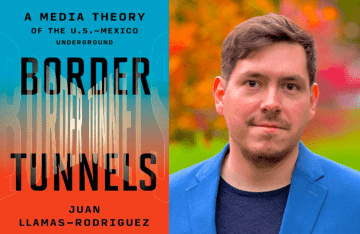
Mediating the U.S.-Mexico Border: A Conversation about Border Tunnels
- Annenberg School for Communication, Room 500
The Annenberg Center for Collaborative Communication invites you to celebrate Prof. Juan Llamas-Rodrieguez.
Join us to celebrate the publication of Border Tunnels: A Media Theory of the U.S.-Mexico Underground by Juan Llamas-Rodriguez, Assistant Professor at the Annenberg School for Communication.
The book launch will be held in person at the Annenberg School for Communication in Room 500 5:00 to 7:00pm EST and is open to the public. To be followed by a drinks reception nearby.
This event is proudly co-sponsored between the Annenberg Center for Collaborative Communication (C3) and the Penn Migration Initiative (PMI) and is a part of the PMI's Spring 2024 Speaker Series.
About the Book
Border Tunnels: A Media Theory of the U.S.-Mexico Underground
Border tunnels at the U.S.–Mexico border are ubiquitous in news, movies, and television, yet, because they remain hidden and inaccessible, the public can encounter them only through media. Analyzing the technologies, institutional politics, narrative tropes, and aesthetic decisions that go into showing border tunnels across multiple forms of media, Juan Llamas-Rodriguez argues that we cannot properly address border issues without attending to — and fully understanding — the fraught relationship between their representation and reality.
Llamas-Rodriguez reveals that every media text about border tunnels, whether meant for entertainment, cable news, video games, or speculative design, implicitly takes a position on the politics of the border. The examples laid out in Border Tunnels will teach readers how to look differently at the border as it is commonly presented in various forms of media, from ABC’s Nightline and CNN’s Anderson Cooper 360º to reality TV, propaganda videos, and even digital effects in Hollywood action films. Llamas-Rodriguez examines how creative decisions in the production, promotion, and distribution of these media texts either emphasize or downplay issues such as border security, racial dynamics of migration, and sustainability of the borderlands.
Focusing on tunnels to show how media representations can influence all kinds of audiences — even those physically near the border — Border Tunnels helps us make sense of this pressing social issue, ultimately advancing understanding of the U.S.–Mexico border in all of its complexity and precariousness.
About the Author
Juan Llamas-Rodriguez is an assistant professor at the Annenberg School for Communication, where he researches and teaches global media cultures, digital technologies, border studies, infrastructure studies, and Latin American media.
His research mobilizes media and communication theories to critically analyze borders, migration, and related social dynamics on a global scale. He focuses on cultural approaches to digital and interactive media from Latin America and by Latinx diasporic communities.
About the Center
The Annenberg Center for Collaborative Communication enables scholars to think and work across institutional, geographic and disciplinary divides. Jointly established by the USC Annenberg School for Communication and Journalism and the University of Pennsylvania’s Annenberg School for Communication, the center’s faculty, postdoctoral fellows and doctoral students seek to address emerging global issues broadly across the field of communication and media.
The first-of-its-kind center not only explores what “collaboration” means for the field of communication and media, but also provides critical infrastructure for reimagining and potentially revolutionizing how collaborative communication can be used to address complex issues such as health care, data privacy, cultural and demographic change, politics, new media, gender/racial equity and justice, media literacy and policy, journalistic trust, and the restructuring of media industries in an evolving age of streaming and networked distribution.
Events
View AllDisclaimer: This event may be photographed and/or video recorded for archival, educational, and related promotional purposes. We also may share these video recordings through Annenberg's website or related platforms. Certain events may also be livestreamed. By attending or participating in this event, you are giving your consent to be photographed and/or video recorded and you are waiving any and all claims regarding the use of your image by the Annenberg School for Communication. The Annenberg School for Communication, at its discretion, may provide a copy of the photos/footage upon written request.
